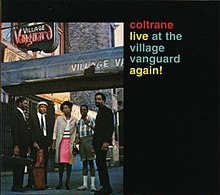
John William Coltrane was an American jazz saxophonist, bandleader and composer. He is among the most influential and acclaimed figures in the history of jazz and 20th-century music.
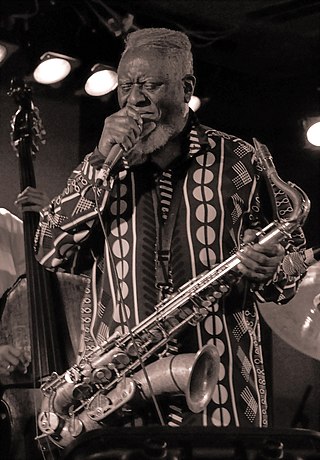
Pharoah Sanders was an American jazz saxophonist. Known for his overblowing, harmonic, and multiphonic techniques on the saxophone, as well as his use of "sheets of sound", Sanders played a prominent role in the development of free jazz and spiritual jazz through his work as a member of John Coltrane's groups in the mid-1960s, and later through his solo work. He released over thirty albums as a leader and collaborated extensively with vocalist Leon Thomas and pianist Alice Coltrane, among many others. Fellow saxophonist Ornette Coleman once described him as "probably the best tenor player in the world".
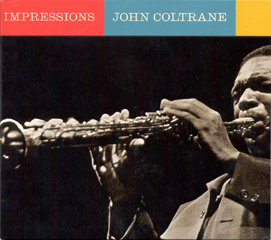
Impressions is an album of live and studio recordings by jazz musician John Coltrane, released by Impulse! Records in July 1963.

A Monastic Trio is the first solo album by Alice Coltrane. It was recorded in 1968 at the John Coltrane Home in Dix Hills, New York, and was released later that year by Impulse! Records. On the album, Coltrane appears on piano and harp, and is joined by saxophonist Pharoah Sanders, bassist Jimmy Garrison, and drummer Rashied Ali, all of whom were members of John Coltrane's last quintet. Drummer Ben Riley also appears on one track. The album was reissued on CD in 1998 with three additional tracks, one of which is a piano solo recorded in 1967.

Live in Japan is a live album by American saxophonist John Coltrane, recorded for radio broadcast during his only Japanese tour in July 1966 at two Tokyo venues, Shinjuku Kosei Nenkin Hall and Sankei Hall. The recordings feature his last group, a quintet featuring Coltrane, his wife/pianist Alice, saxophonist/bass clarinetist Pharoah Sanders, bassist Jimmy Garrison and drummer Rashied Ali.

Ascension is a jazz album by John Coltrane recorded in June 1965 and released in 1966. It is considered a watershed in Coltrane's work, with the albums recorded before it being more conventional in structure and the albums recorded after it being looser, free jazz inspired works. In addition, it signaled Coltrane's interest in moving away from the quartet format. AllMusic called it "the single recording that placed John Coltrane firmly into the avant-garde".

Om is a posthumously-released album by John Coltrane, recorded on October 1, 1965, one day after the recording of Live in Seattle, and one day prior to the recording of the music heard on A Love Supreme: Live in Seattle. The album, which features Coltrane's quartet plus three additional players, consists of a single 29-minute work that was split into two parts when released on LP. Om was issued by Impulse! in 1968, and was also included on The Major Works of John Coltrane, a compilation CD released in 1992.

The Olatunji Concert: The Last Live Recording is the Impulse! Records-released final live recording of saxophonist John Coltrane, recorded April 23, 1967, at the Olatunji Center of African Culture in New York and released on Compact Disc in 2001. The album consists of two songs—"Ogunde", which Coltrane also recorded for his final approved album, Expression, and an especially free-form "My Favorite Things", which Coltrane had performed live regularly since 1960. The recording was made for broadcast on Billy Taylor's local radio station, WLIB. The Olatunji Concert was not Coltrane's last show, but rather, his penultimate—he would play once more on May 7, 1967, in Baltimore.
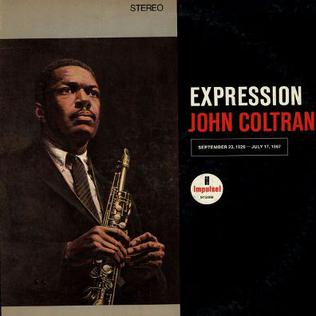
Expression is an album by jazz saxophonist John Coltrane, recorded in early 1967 and released in late September of that year, around Coltrane's birthday, and two months after his death. This was the first posthumous release of a Coltrane recording, and the last album he personally authorized.

Coltrane "Live" at the Village Vanguard is a live album by jazz musician John Coltrane, released in February 1962 on Impulse Records. It is the first album to feature the members of the classic quartet of Coltrane with McCoy Tyner, Jimmy Garrison, and Elvin Jones, as well as the first Coltrane live album to be issued. In contrast to his previous album for Impulse!, this one generated much turmoil among both critics and audience alike with its challenging music.

The Major Works of John Coltrane is a compilation album by jazz musician John Coltrane, released in 1992 by GRP Records. It features extended compositions, all recorded in 1965 with expanded ensembles, and originally released by Impulse! Records on Ascension, Om, Kulu Sé Mama, and Selflessness: Featuring My Favorite Things. Both editions of Ascension are included.

Live in Stockholm 1961 is an album by featuring live performances by jazz musician John Coltrane recorded in November 1961 at the Koncerthusen, Stockholm.
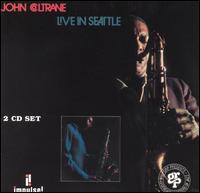
Live in Seattle is a live double album by jazz saxophonist John Coltrane, recorded in 1965 and released posthumously in 1971 on the Impulse! label. The album consists of a set played by Coltrane's quartet at The Penthouse on September 30, 1965. Along with the later-released A Love Supreme: Live in Seattle, recorded two days later at the same club, they are the only officially released live recordings of Coltrane's six-piece lineup from late 1965. The original double LP issue was expanded to 2 CDs for the reissue.

Live in Antibes is a live album by jazz musician John Coltrane that was released in 1988 on the France's Concert label.

Selflessness Featuring My Favorite Things is a posthumous album by jazz musician John Coltrane, released in 1969. The album juxtaposes two tracks recorded live at the 1963 Newport Jazz Festival with a single track ("Selflessness") recorded in a studio in Los Angeles in 1965.

Cosmic Music is a jazz album by John Coltrane and Alice Coltrane released after John Coltrane's death. John Coltrane only plays on two tracks, "Manifestation" and "Reverend King".

Offering: Live at Temple University is a live album by John Coltrane recorded in 1966 and released posthumously by Resonance Records on September 23, 2014, Coltrane's 88th birthday. The album won the Grammy Award for Best Album Notes and was well-received by critics. Proceeds from the album benefit the John Coltrane Home.

Dear Old Stockholm is a compilation album by jazz musician John Coltrane released by GRP and Impulse! in 1993. The music, which was recorded on April 29, 1963 and May 26, 1965 at Van Gelder Studio in Englewood Cliffs, NJ, features Coltrane's quartet with Roy Haynes substituting for Elvin Jones on drums.
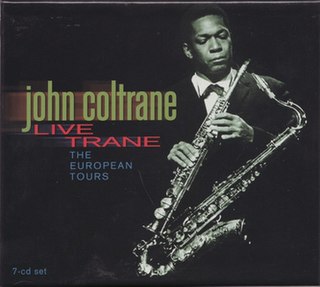
Live Trane: The European Tours is a 7–CD compilation album by American saxophonist John Coltrane containing music recorded live during 1961, 1962, and 1963 European tours, all of which took place under the auspices of Norman Granz's Jazz at the Philharmonic programs. The album, which was released in 2001 by Pablo Records, features Coltrane on tenor and soprano saxophones along with pianist McCoy Tyner, bassists Jimmy Garrison and Reggie Workman, and drummer Elvin Jones. In addition, Eric Dolphy is heard on alto saxophone, bass clarinet, and flute on a number of tracks.

So Many Things: The European Tour 1961 is a 4–CD compilation album by American saxophonist John Coltrane containing music recorded live during the 1961 European tour, which took place under the auspices of Norman Granz's Jazz at the Philharmonic programs. The album, which features Coltrane on tenor and soprano saxophones along with multi-instrumentalist Eric Dolphy, pianist McCoy Tyner, bassist Reggie Workman, and drummer Elvin Jones, was released in 2015 by Acrobat Music.
